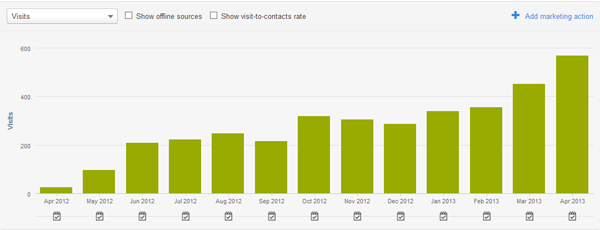 Those of us who use inbound marketing to grow our businesses have learned that our marketing engines require fuel. That fuel is marketing content: blog articles, eBooks, videos, webinars, landing pages, calls-to-action. The beauty of content marketing is that it puts us all on a level playing field. It doesn't matter if you're a multinational corporation or a solo-preneur; if you produce good content, people will find it, read it, watch it and most importantly share it. Google loves good content. If you consistently produce good content that gets shared, Google will reward you with high search engine rankings for your targeted keywords. Here's a summary of organic search visits to my website since I began my content marketing efforts in April 2012:
Those of us who use inbound marketing to grow our businesses have learned that our marketing engines require fuel. That fuel is marketing content: blog articles, eBooks, videos, webinars, landing pages, calls-to-action. The beauty of content marketing is that it puts us all on a level playing field. It doesn't matter if you're a multinational corporation or a solo-preneur; if you produce good content, people will find it, read it, watch it and most importantly share it. Google loves good content. If you consistently produce good content that gets shared, Google will reward you with high search engine rankings for your targeted keywords. Here's a summary of organic search visits to my website since I began my content marketing efforts in April 2012:

The stage is set for bad actors
You may guess that showing the results of my content marketing indicates that I'm proud of my efforts. Damn right I am! I've worked hard to never miss self-imposed deadlines and to produce content that gets results for my business and customers. I've gotten up more than once at 4 AM to make sure I met an 8:30 AM publishing deadline. Most of us don't take shortcuts when we produce content for our businesses or our customers. However, with the proliferation of businesses using content marketing and the sheer volume of content on the internet, the stage is set for those bad actors who do want to take shortcuts.
A clear-cut case of plagiarism
I wrote an article titled Why Social Media Marketing Is More Effective Than PR on April 18, 2013. The article was picked by Social Media Today on April 19 and as of today, has been shared over 1,600 times. I was doing SEO research last week to gauge how the article impacted my search engine rankings on Google. I entered several related terms into Google to see where my article ranked. While doing this research, I saw a sentence in the meta description of another blog article shown in the search engine rankings that looked familiar. Upon further investigation, I found that an article by a digital marketing agency in Florida published on April 25, 2013 included 4 verbatim sentences lifted from the article. Most of the rest of the article was a slight re-write of my article, with many sentences duplicating mine with the exception of one or two words. No one took credit for the article. It was published under the pseudonym, "Blog Editor." I was furious - here was a competitor stealing my work to get a top ten ranking on Google. It was liking watching a car thief driving down the street after stealing your car.
I immediately confronted the agency owner in a phone call. He professed ignorance of the plagiarism and asked me to email him the evidence. Which brings me to my first piece of advice for victims of content theft - take a screen shot of the evidence immediately. The agency owner pulled the page down immediately, but I had a PDF copy of the plagiarism. He then called me, apologized profusely and pointed the finger at a recent college graduate who was his blog editor. He also shared with me that he led worship services at his church. Although I may be getting played, I judged his apology as sincere and decided not to pursue the matter. It's important for those who outsource content creation to realize that their providers may be stealing content on their behalf. Regardless of who did it, the business owner is responsible for any plagiarism committed on their behalf.
A less clear-cut case
I'm not an attorney and can't comment on common-law copyright protection and Fair Use doctrine, so I'm not exactly sure how I feel about the case I'm about to describe. I downloaded an eBook from a prominent internet marketing software company yesterday and found a screen shot of my pricing page right there on page 6 of their eBook. It was attributed to "an agency that offers inbound marketing services." No mention of my company, no link to my website. To be fair, I've cited this company's research in my blog. Every time I've done so, I clearly identified the source of the research and provided a link to one of their landing pages. Further, the pricing table was designed by my strategic web design partner, Melissa Roberge of Inbound Design Studio.
My first emotional reaction was to feel flattered that a prominent company was sharing my content as an example of how to do things right. This soon gave way to this conversation in my head: "Really? With all your venture funding and on-staff design professionals, you take my content without compensation or attribution? You didn't even call me to ask me if you could use it. I certainly would have said yes if asked." I wrote an email that essentially duplicated the conversation in my head and haven't heard back.
For those of you reading this, I have a question: What do you think of this case? Am I right to be upset about it? Please share your thoughts in the comments section below - it would be much appreciated by me.
Summary
My purpose in writing this article is to warn companies using content marketing that content theft happens all of the time. There seems to be a sense that it's the internet and anything's fair game. If you're outsourcing content creation, you're responsible for what's published under your company's name. Be careful, you could be plagiarizing others without even knowing it. Rather than plagiarizing 2 excellent articles that explain how to protect yourself from content theft, let me simply point you to the articles with full attribution:
Brand Asset Theft: What to do when someone steals your web content - Dale Berkebile, Brandwise
Are People Stealing Your Content? How (and When) to Fight Back - Ginny Soskey, HubSpot








